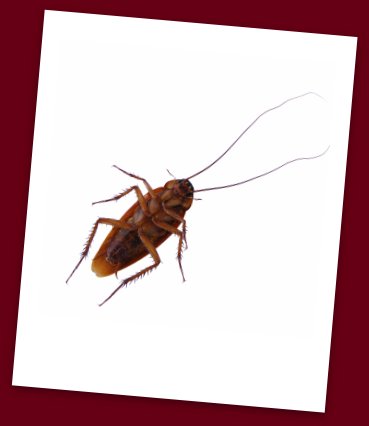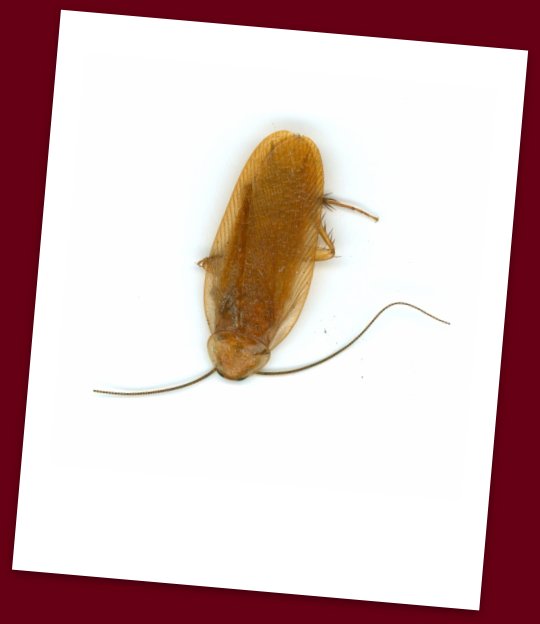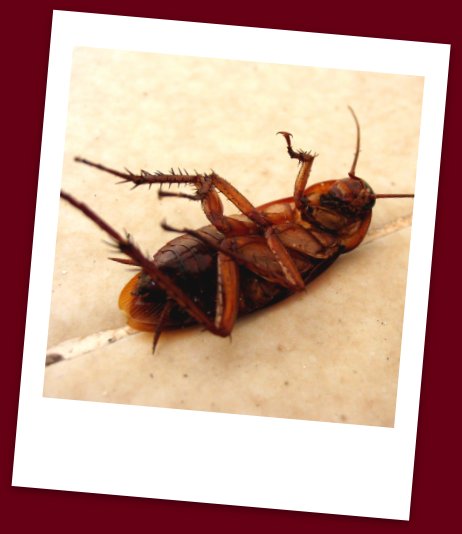|
Pest Alert: Roaches
Roaches are insects that have one purpose in life; find food and water. As they do so, their disgusting habits create a culture that creates a breeding ground for germs that can easily transfer to your food. There are several different kinds of roaches, depending on your weather climate, but most can contaminate our food supplies if given the chance, so it’s best to watch out for all kinds of roaches.
Cockroaches go after any organic food supplies, including glue! They pretty much can eat anything organic in nature. They like to find dark areas, like cabinets, under counters, and are always looking for water supply. That leaky connection to your home kitchen sink can be the perfect spot for them to find water supplies. Roaches tend to stay away from humans as much as they can. If they are coming out in broad daylight, they typically are looking for food that they couldn’t find last night. So, if you see one, you’re usually being visited or sharing a home with several of them. Depending on how long they have had to gather, you may be in for a fight.
Roaches look for any food source: as a result, they will find and eat anything that they can, including feces, garbage, scraps, glue, paper, just about anything. While that may be good for nature to have something that cleans up the garbage in nature, when you mix this fact with our food as humans, we have a lethal combination. The roach picks up germs like Salmonella, E-coli, Shigella, and a host of viruses including Norovirus, which then is transferred to your food. Which go right into your mouth… enjoy!
Different varieties of roaches can mean different problems: some roaches can fly, some can swim through sewers, and others travel in cardboard. Doesn’t matter which kind you have – treat them all like a problem! Roaches, if they are daring enough, have been known to try to eat human skin… no I’m not kidding… they can nibble on your ears in your sleep!
So, what if you have Cockroaches? If you notice one, you probably have a lot of problems somewhere… determining the extent of the issue is key. Start to look out for them immediately. Get a on your hands and knees, looking under counters, cupboards, behind the oven or fridge (they like the heat too!). They may be hiding from you. Determining the amount of the problem defines how you proceed. If you have what you appear to have a minor problem, check with your local hardware store for suggestions based on the kind and amount. Follow the directions for any chemical very carefully – not using it properly can lead to getting yourself or your family sick as well! If you find a lot, then you want to make some calls for an expert. Find a licensed pest specialist in your area. Ask for insurance and a guarantee. You don’t want an amateur dealing with this problem. Chances are, something attracted them to your home – find what they like and clean it up! Keeping your kitchen clean is key to controlling roaches. And be on the lookout for them to come back!
|





 I’m going to be honest here, roaches are the critters that give me the “hebbie gebbies.” You may have one or two of those yourself. The reason? Roaches are disgusting creatures.
I’m going to be honest here, roaches are the critters that give me the “hebbie gebbies.” You may have one or two of those yourself. The reason? Roaches are disgusting creatures.  Roaches eat each other: roaches are cannibals. One of them dies; his brothers and sisters will eat the deceased. This is one way that chemicals can actually kill of number of them, but also part of the problem. Roach bait may draw a roach to it, which eats it and then goes back to the family and dies, his brothers then eat him and they die, however, a few generations down, the poison will have been diluted out to the point that the roaches may develop an immunity to the poison which can make the bait ineffective. As a result, it is best to have a professional deal with a severe infestation.
Roaches eat each other: roaches are cannibals. One of them dies; his brothers and sisters will eat the deceased. This is one way that chemicals can actually kill of number of them, but also part of the problem. Roach bait may draw a roach to it, which eats it and then goes back to the family and dies, his brothers then eat him and they die, however, a few generations down, the poison will have been diluted out to the point that the roaches may develop an immunity to the poison which can make the bait ineffective. As a result, it is best to have a professional deal with a severe infestation.  How do you control? Start with proper
How do you control? Start with proper 
